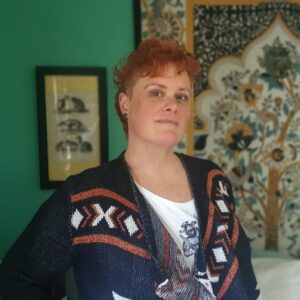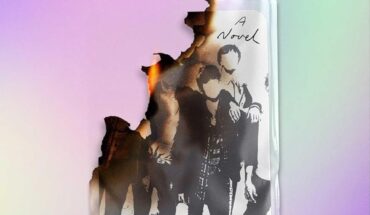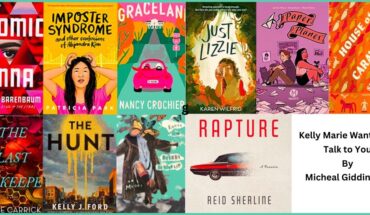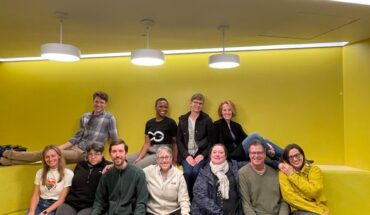Next Chapters is a biweekly feature spotlighting graduates of GrubStreet’s Novel Incubator program, which has been running since 2010.
Novel Incubator Year: 2
Current Project: Hobberdidance (tentative title), a historical novel in which three women accused of demonic possession find themselves pawns in a war for the soul of England.

Photo by Alicia Montano Rodriguez
What writers have most influenced your writing?
If you want to go way, way back, the book that made me want to write historical fiction was Caleb Carr’s The Alienist. After I read it, I had my mother drive me to the library in Pittsburgh so I could read all the New York Times from 1896 on microfiche. I was there so long I developed a twitch in my eyes. But the writers who really taught me how to appreciate language, to love the craft of writing itself and all that it could do, were Virginia Woolf, Toni Morrison, and Oscar Wilde—my three high school obsessions, if you don’t count Shakespeare. I went through a phase where I’d sit in my room all day reading Hamlet aloud to myself, playing all the parts. I wanted to know that play inside and out; I wanted to know it as Shakespeare knew it. When you’re 16, you actually think that’s possible!
What’s the origin story of your incubator novel?
When I was about 14, I came across a copy of Christopher Marlowe’s Doctor Faustus on my father’s bookshelf. I was fascinated with the play—I can’t even remember why exactly. Something about the little gold devil on the cover or even the musicality of the name itself: Chris-tŏ-pher Mar-lowe. No wonder he was a master of pentameter! So I asked my dad about the book, and he started telling me not about the play, but the author: how he was rumored to have been a spy, a heretic, and homosexual. How he was murdered at age 29. I felt magnetized by this person who had died 400 years ago. At 14 I already knew I was “not straight,” and without fully realizing it, I was looking for people like me everywhere. It was a revelation that I could also look in the past for queer ancestors. I didn’t start trying to write a novel about Marlowe until my 20s, of course, but that was the moment I think I started writing one in my head. It was in college that I started eating, sleeping, breathing Marlowe. I’ve now spent a full half of my life researching him—and there’s always something new to discover.
What is your greatest struggle on the page? What would others say is your writing superpower/strength?
I think I struggle most with just getting started. The thing they don’t tell you about writing is, it’s a kind of sculpture. Except you don’t start out with a block of marble—you actually have to make the marble before you can get on to the real work, which is chiseling it into shape. Writing is mostly editing. Generating that first draft, that big lump of stone, is just the beginning.
I often get complimented on the visual qualities of my writing. Some writers get offended if you call their work “cinematic”; I’m not one of them.
What strategies do you use when you’ve hit the wall?
I know I’ve really hit the wall when I can’t bear to pick up a book. But the only way to get going again is to read, so sometimes I’ll go back and reread an old favorite just to get the wheels turning. Often the initial inspiration to tell a certain story comes to me while I’m reading, so usually I’ll revisit the book that planted the seed.
Tell us about the publishing process.
I’m right at the beginning of this process, but one thing I can address is that everything will take twice as long as you expect, so try not to despair. If anyone tells you to take something as “a sign,” just don’t. I’ve had two agents in the past 10 years. To get my current agent, I queried something like 200 people over two years before a novel competition gave me a lucky break. If I’d paid attention to the “signs,” I absolutely would have given up. So don’t.
What is your favorite punctuation mark? Why?
The semicolon. If sentences are chains, then semicolons are links between chains, taking two separate things and making them one. It gets a bad rap, but without it, we could not have Louise Glück’s “Snowdrops”:
… You know
what despair is; then
winter should have meaning for you.
Hesse Phillips (she/they) was raised next door to a chicken farm in rural Pennsylvania but now lives in Spain. Their first novel Lightborne, about queer Elizabethan playwright Christopher Marlowe, will be published by Atlantic Books UK in 2024. Hesse’s poetry and prose have appeared in The Bridport Review, the époque press é-zine, Roi Fainéant Press, Embark: a Literary Journal for Novelists, and Pangyrus, among others. They have a PhD in Drama from Tufts University and are currently tackling the true story that inspired Shakespeare’s King Lear in their next novel. For out more about Hesse and their work at hessephillips.com on Twitter: @hessephillips or Instagram: @hesse.phillips.



